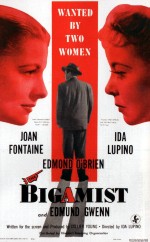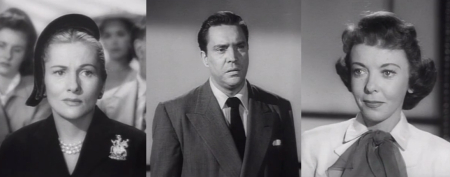 Joan Fontaine was married to Ida Lupino’s husband. That is both the plot of Ida Lupino’s melodrama The Bigamist and the truth of the two stars’ relationship in 1953. Of course, Lupino had already divorced her writing partner and co-producer Collier Young when he married Fontaine in 1952. All three remained friends, and Young maintained his professional relationship with Lupino, even writing The Bigamist for his ex-and-current wives to star in. Unfortunately for the gossip mongers, there’s very little drama in the behind-the-scenes story of The Bigamist, but that’s probably for the best, because the movie is practically drowning in drama.
Joan Fontaine was married to Ida Lupino’s husband. That is both the plot of Ida Lupino’s melodrama The Bigamist and the truth of the two stars’ relationship in 1953. Of course, Lupino had already divorced her writing partner and co-producer Collier Young when he married Fontaine in 1952. All three remained friends, and Young maintained his professional relationship with Lupino, even writing The Bigamist for his ex-and-current wives to star in. Unfortunately for the gossip mongers, there’s very little drama in the behind-the-scenes story of The Bigamist, but that’s probably for the best, because the movie is practically drowning in drama.
The Bigamist is relatively straightforward story of how one man ends up with two wives. Though it preys on the possible unspoken fears of a stay-at-home wife – What if my husband sees another woman when he says he’s at work? What if his ‘business trips’ are to spend time with her? –The Bigamist does not qualify as a Women’s Picture. On the contrary, it’s told from the polygamist protagonist’s point of view.
The story is related mostly in flashback as traveling salesman Harry Graham (Edmund O’Brien again) explains to an adoption agency worker (Edmund Gwenn, aka Santa Claus!) how he was trapped into two marriages by his middle class morality and sense of duty. Poor Harry loves his career woman wife, Eve (Fontaine), though she is distant, and communicates only over breakfast tables or telephones. He finds comfort with a waitress named Phyllis (Lupino), and decides to do the honorable thing when she discovers she’s in the family way. As the judge explains at the end (melodramas use courtrooms so a judge can tell the audience the moral of the film), Harry is not a bad man. Just a confused one.

(Side note: It’s possible that I’ve been watching too much Empire, but I spent all movie waiting for Ida and Joan's characters to discover each other’s existence and claw each other’s eyes out. I was disappointed.)
Though she isn’t credited as screenwriter, Lupino still did triple duty, producing, directing, and starring in her morality melodrama. This was possibly the best cast she ever assembled (thank Fontaine's waning career), and they do an admirable job with a heavy handed script. Being director/producer, she gave herself the better role: the second wife/main love story. That leaves Fontaine breathing life into the mostly cold character of the first wife. O'Brien, around whom the film turns, plays a surprisingly strong romantic lead for this film. He's alternately guilty, charming, and pitiable. The film is shot in Lupino’s customary “realistic,” on-location style, with more noir stylistic flourishes learned from The Hitch-Hiker. Unfortunately, despite its moments, the movie's message doesn’t land.

The problem may be the handling of the subject matter. The film works very hard to explain and empathize with Harry Graham, turning his affair with the waitress into a tragic love story. It’s a surprisingly humanist take on crime (especially this crime), but also an unintentionally trivial one. There’s a sharp disconnect between the deadly serious way bigamy is discussed, and the actual fallout of Harry’s actions: a possible short jail sentence, the temporary bastardization of his son, and two disappointed ex-wives. Folks on Maury get worse.
The Bigamist, like so many of The Filmmakers’ movies, discusses a subject that was verboten in postwar America. But to what end was this movie made? Lupino had such a clear direction for her previous films - illuminating polio procedures, tackling rape, unveiling crime. Bigamy, by contrast, seems ridiculous, despite the serious way the judge preaches about it at the end of the film. While the judge briefly picks at an interesting thread about the double standards of shameful bigamy vs societally tolerated mistresses, it's dropped and quickly forgotten. For the first time, the cinematic crusade of Ida Lupino and The Filmmakers feel fairly flat.

Unfortunately, this would be Lupino’s last directing project for her production company. Her next big screen directing gig was also her final film, thirteen years later. And it was... a comedy?

3/26 - The Trouble With Angels (1966) - Lupino's last feature film involves Rosalind Russell, Hayley Mills, and nuns. (Available on Amazon Prime)